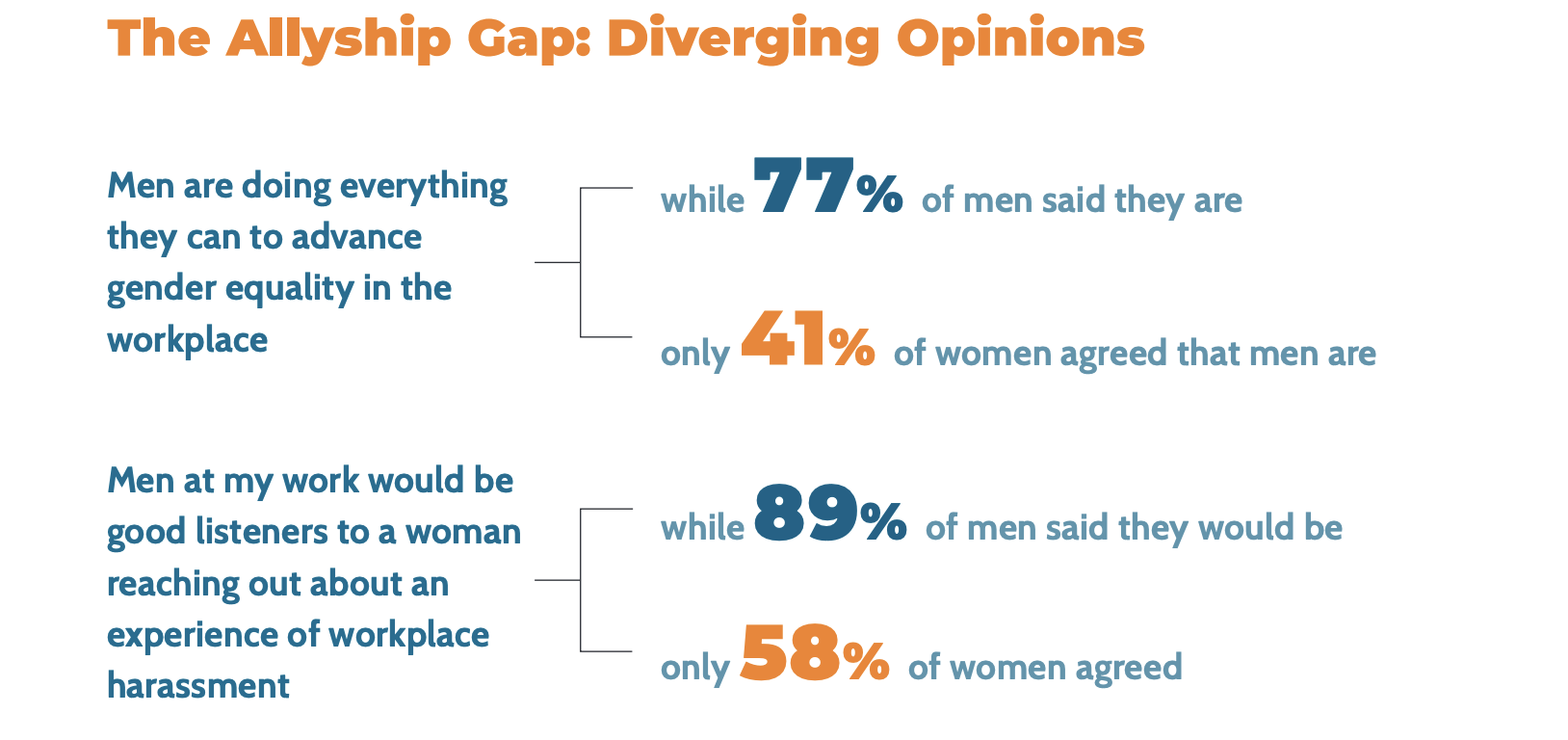
While most men say that they want to support gender equality, a survey produced by Equimundo in partnership with Bonobos reveals that they are not necessarily taking steps to reduce gender discrimination and harassment.
On International Women’s Day, here are nine steps men can take to close the gap between intentions and actions when it comes to becoming better allies to co-workers, partners, friends, and family.
1. Listen to women and non-binary people, and acknowledge their experiences.
The first step toward becoming a better ally for gender equality is to listen to women and non-binary people, acknowledging that every person has a different life experience and perspective. What is needed from allies can vary from person to person, so taking a holistic approach to understanding what women and non-binary people say they need is critical. Practicing active listening, speaking from your own experience, asking questions, and not interrupting goes a long way in recognizing the limits of your ability to fully understand what women or individuals of other gender identities may experience.
2. Reflect on your own power and privilege as a man.
Ask yourself how your race, sexual orientation, gender identity, religion, and ability affords you certain privileges, and how those factors impact your lived experience. Use your power to challenge sexist, homophobic, and transphobic attitudes in the workplace and other social settings. When it’s appropriate, be the one who starts conversations about workplace discrimination, supporting women and non-binary people at work, and creating spaces for all people to feel safe, seen, and supported. In the same vein, recognize when it’s better to remain silent and to listen.

3. Credit the women and non-binary people in your workplace where credit is due.
We know that women are still under-represented and paid less than their male colleagues, so when it’s possible, name the colleagues who worked on a project or came up with an idea. Correct people if they misattribute you for an idea that your coworker thought of. Emphasize a good idea when you hear it, and mention it in front of senior management or at meetings.
4. Advocate for women and non-binary individual’s leadership and equality in the workplace.
It’s important to continuously challenge obstacles and gender stereotypes that limit advancement. Is your workplace hiring? Schedule a meeting with your human resource department about how to recruit a diverse pool of applicants. Talk to your supervisor about pay transparency and reporting structures for sexual harassment. Advocate for and support the women and non-binary individuals at your workplace to take the lead in new projects.
5. Speak up when you hear sexist language, and call other men out when they use it.
When you hear sexist, racist, homophobic, or transphobic language, step in and make it clear that you don’t support it. Ask the person to explain the “joke,” and tell them why it’s inappropriate by explaining that those jokes stem from harmful stereotypes and have real world implications on marginalized individuals.
6. Learn to live with discomfort. Being an ally is about making change, not being comfortable.
When you’re used to having certain privileges and powers in life, it will feel uncomfortable to be critique, acknowledge, and release certain privileges. Regardless, it’s important to remember that the discomfort of stepping in or speaking up as an ally is not greater than the experience of being harassed or discriminated against for your gender identity, your sexual orientation, and/or your race.
7. Step up at home, advocate for work-life balance and paid leave for all caregivers, and be a full partner in childcare and domestic work.
We know that when men take on an equal share of the unpaid care work, it advances pay equality and women’s health and well-being. Remember to put as much time and effort into equitable partnership at home as you do toward gender equality in the workplace, by having a discussion about what you both spend your time on and how to create a plan that works for you both to thrive.

8. Volunteer for nonprofit organizations that do good work and support gender equality.
Donate your time or resources to nonprofit organizations with values that promote increasing gender equity, ending homophobia and transphobia, ending racism, and reducing male violence. You can also ask friends or colleagues about the groups they support. Almost every nonprofit organization – especially those providing services for underserved people in your community – has limited resources to meet its mission. They value volunteers like you who can help.
9. Support diverse women and non-binary leaders you believe in.
Learn more about political candidates in local and national elections, and show your support, volunteer, and vote for women and non-binary candidates who promote gender equality. Beyond that, recognize when comments regarding female candidates are sexist or unrelated to their work. Ask yourself if those apprehensions would be the same if that candidate were a man.
